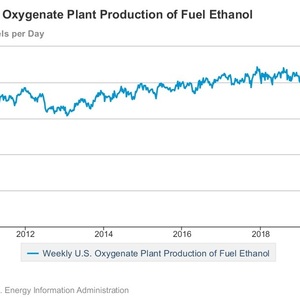EIA increases 2020, 2021 ethanol production forecasts

August 11, 2020
BY Erin Krueger
The U.S. Energy Information Administration slightly increased its forecasts for 2020 and 2021 ethanol production in its latest Short-Term Energy Outlook, which was released Aug. 11. Forecasts for ethanol blending were also revised up.
The EIA currently predicts ethanol production will average 910,000 barrels per day this year, up from the 900,000-barrel-per-day prediction made in the agency’s July STEO. The EIA has also increased its forecast for 2021 ethanol production to an average of 1.01 million barrels per day, up from its July prediction of 1 million barrels per day. Production averaged approximately 1.03 million barrels per day in 2019.
Advertisement
Advertisement
On a quarterly basis, ethanol production is expected to average 930,000 barrels per day during the third quarter of this year, increasing to 970,000 barrels per day in the fourth quarter. EIA data shows ethanol production averaged 1.02 million barrels per day during the first quarter of 2020, falling to 710,000 barrels per day during the second quarter. In 2021, ethanol production is expected to average 1 million barrels per day during the first quarter, 1.01 million barrels per day during the second quarter, and 1.02 million barrels per day in the third and fourth quarters.
The EIA currently expects the U.S. to blend 840,000 barrels per day of ethanol this year, up from the July prediction of 836,000. Blending in 2021 is expected to average 930,000 barrels per day, up from the 919,000-barrel-per-day prediction made in July. Ethanol blending averaged 950,000 barrels per day in 2019.
Advertisement
Advertisement
The EIA’s most recently weekly ethanol data shows production averaged 931,000 barrels per day the week ending July 31, down from 958,000 barrels per day the previous week. Ethanol stocks were at 20.346 million barrels the week ending July 31, up form 20.272 million barrels the previous week.
The agency’s most recent monthly data shows the U.S. imported 255,000 barrels of ethanol in March, all from Brazil. The U.S. exported 1.622 million barrels of ethanol in May, primarily to India, Canada and Mexico.
Related Stories
Bangkok Airways Public Company Limited has officially announced the adoption of sustainable aviation fuel (SAF) on its commercial flights, reinforcing Thailand’s green aviation industry. The initiative took effect starting July 1, 2025.
Avalon Energy Group LLC and Sulzer Chemtech have signed a strategic alliance and partnership agreement to scale up the production of SAF. Under the agreement, Avalon has selected BioFlux technology for its portfolio of SAF projects.
The USDA has announced it will delay opening the first quarterly grant application window for FY 2026 REAP funding. The agency cited both an application backlog and the need to disincentivize solar projects as reasons for the delay.
Neste and DHL Express have strengthened their collaboration with the supply of 7,400 tons (9.5 million liters) of neat, i.e. unblended, Neste MY Sustainable Aviation Fuel to DHL Express at Singapore Changi Airport starting July 2025.
CoBank’s latest quarterly research report, released July 10, highlights current uncertainty around the implementation of three biofuel policies, RFS RVOs, small refinery exemptions (SREs) and the 45Z clean fuels production tax credit.
Upcoming Events










